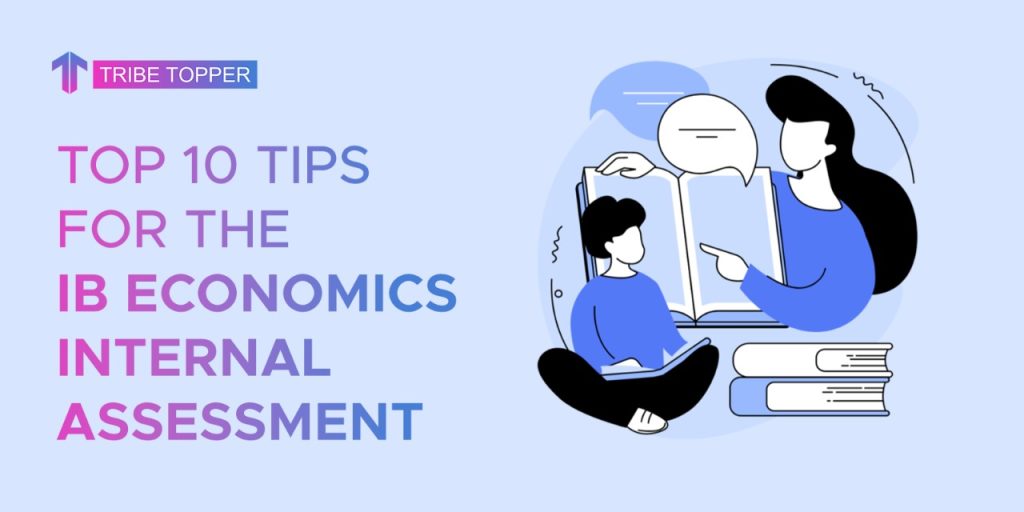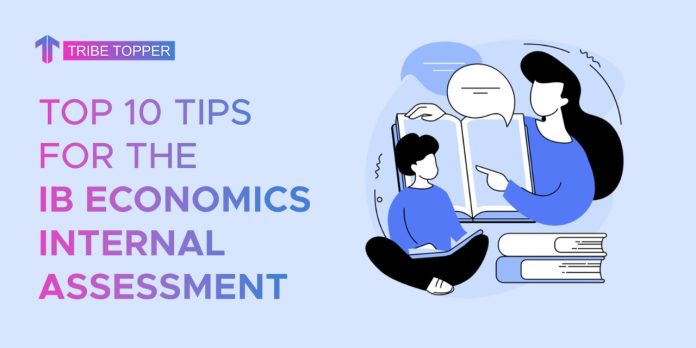In any subject, the Internal Assessment is one of the few times you can put in extra work and turn it out for a grade. It’s also one of the most important parts of your coursework as it offers an opportunity to show off your best command of the subject. Many high schools have students who chose to take the IB Economics Internal Assessment.
Depending on the student’s interests and motivations, the exam can be a big challenge or not. While there are some things that will help students prepare for this exam, it isn’t all about studying what you’re taught in school or memorizing formulas. Here are ten tips that will help you make a better IB Economics Internal Assessment.

1. Manage your time
Time management is a very important aspect of the IB Economics Internal Assessment. It is vital to have a well-planned time management schedule in order to complete all tasks on time, as well as avoid wasting any time. It is important not just to plan how much time you will spend on each task, but also how you will use that time.
This means carefully considering whether or not it is better to work through a problem for 20 minutes and then move on to another one, or if it would be better to tackle the next problem straight away with no distractions from previous ones.
Time management can be incredibly helpful when it comes to avoiding procrastination and creating a productive working environment for yourself.
2. Work on the words
The IB Economics Internal Assessment is a paper that requires you to give an in-depth analysis of the theory and practice of economics. The task is to express your thoughts on the subject in the form of a written essay. Your essay must be at least 150 words long and use British English (grammar and spelling). However, you can use any word processor to write your essay.
The introduction is where you should introduce yourself and your course. If you have any special information or links that relate to your topic, include them in this section.
You may also want to include a section that highlights the connections between your course and other courses at the same level as yours (e.g., IB Economics is linked to other IB Economics courses). If there are any connections that are relevant to your course but not directly related to economics, make sure you address them here. This way, students will know what they’re getting into when they take your course!
3. Diagram Drawing
Drawing diagrams is a useful skill for many types of economics. This guide will help you get started with diagram drawing and make the most of the internal assessment process. Here are some tips for doing well on the IB Economics Internal Assessment: Diagram drawing.
- Create a diagram that shows how your argument is structured and how it connects to other arguments or theories. You should also include a caption for each section of the diagram so that it’s easy for others to follow along.
- Make sure that you include all relevant information in your diagram, but don’t overdo it – if you have too much text on your page, it will look cluttered and unprofessional.
4. Diagram Explanation
The first thing you should do is read through the whole diagram and write down all the information that you can. This is a very important step because it will allow you to see what information was missing and what questions have already been answered.
After this step, you can start making notes on your own. You might want to write down what each part of the diagram means, how much time it took for you to read it, and any other information that might be helpful for future reference. You may also want to use a calculator (or even a pen and paper) at this point in order to solve some of the mathematical problems that are given in each individual diagram.
The diagrams on the IB Economics Internal Assessment are different from those in other subjects like Physics or Chemistry. The diagrams in Economics are easier to understand than those in other subjects because they are smaller and simpler than those in other subjects.
5. Develop Your IB Economics IA Explanation
As an IB Economics Internal Assessment (IA) candidate, you will be required to write a 2-3 page paper explaining the ‘Internal Assessment’. This is a great opportunity for you to develop your IB Economics IA explanation skills and demonstrate your ability to think critically and creatively.
This is a very important step in the process of writing an IB Economics Internal Assessment. It’s not only important because it helps you to develop your explanation and prepare you to write it, but also because it can help you to improve your IA structure and organization skills.
Here are some useful tips on how to develop your IB Economics IA Explanation:
- Write down all the main ideas of your paper before starting to write it down.
- Understand what type of question you are going to answer and what kind of information is required from your paper.
- Make sure that all the information that you gather is correct and relevant to the question asked by your examiner/assessor/teacher during the internal assessment process.
- Make sure that all the information provided in your paper is accurate, complete, relevant, and sufficient for answering the question asked by your examiner/assessor/teacher during the internal assessment process; otherwise, he/she may mark it down wrong due to missing or insufficient data or irrelevant data which does not fit into his/her expectations before marking up his/her answers.
6. Evaluate your work
Evaluate the use of quantitative and qualitative methods to study the topic. Write a short summary of the chapter and explain how it relates to the IB Economics Internal Assessment, the IB Economics Course Outline, and the IB Economics Course Notes. The first tip is to read the question carefully. The IB Economics Internal Assessment is a written test and you need to understand what the question is asking you. This will ensure that you do not miss out on any information that could help you answer the question.
The second tip for the IB Economics Internal Assessment is to pay attention to all of the details of an issue. It is important to understand how decisions are made, as well as how they affect different people in society. If you do not understand these details, then it could be very difficult for you to answer questions related to them.
The third tip for the IB Economics Internal Assessment is that it is very easy to get distracted while doing your work, especially if there are many things going on around you at once. This can cause problems when trying to complete assignments on time, which means that soon there will be no more time left before the deadline comes up again.
7. Revision
Make sure you understand what is being assessed by reading the instructions carefully. Read through questions until you have an idea of what is expected of you. It’s important to know what is expected of you IB Internal Assessment, as well as how to answer questions correctly and why they were written this way.
Make sure you have all of your books handy before starting any tasks. You may need to refer back to them throughout the day or during breaks in order to help you with some questions and fill out some blanks on the worksheet that will be given at the end of each section (IBA).
8. Participate in small test round
The IB Internal Assessment is a diverse and challenging test. The best way to prepare for the IB Economics Internal Assessment is by taking it in small test rounds. This will allow you to focus on individual topics, one at a time, rather than trying to study all five topics at once. If time is of the essence and you have little time for preparation, then you can use the online practice tests provided by the IB for this purpose.
I strongly recommend that you take part in the mock marking session for both papers, as it will give you an idea of what questions you should expect and how long they will take.
9. Ask for experts to review your practice
It is essential that you give your practice a good review. The IB Internal Assessment provides a set of questions, and there are many more questions on the external exam. You have to give your answer in just one hour!
So, the best way to prepare for the IB Economics Internal Assessment is by asking an expert to review your practice. The IB will not be able to help you with your answers if you do not show them what you have done so far.
I suggest that you get as many people as possible to help you with this task: friends or family members, teachers or tutors at school/university, and anyone who has some knowledge about economics or finance.
10. Stress management
It can be difficult to focus when you’re under pressure, but it’s important not to let this affect your score. Take regular breaks throughout the day and during the test itself. If you’re feeling over-tired or stressed, take a break at least every 30 minutes and get back on track as quickly as possible.
If you’re feeling nervous about sitting an IB Economics it’s important that you calm down before taking the test. Try relaxation techniques like deep breathing or yoga which will help reduce your stress levels and boost your concentration levels so that you can focus on answering questions rather than worrying about them!
Conclusion
Hopefully this has given you some useful tips on how to approach writing your IB Economics Internal Assessment. We’ve tried to keep everything general, so as to make it useful for all students across the board. Hopefully, these suggestions will help you meet the challenge of the Internal Assessment and come out with a grade worthy of your hard work.











